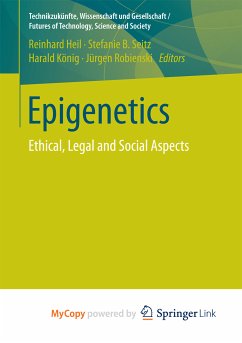Modern epigenetics unites scientists from life sciences, organic chemistry as well as computer and engineering sciences to find an answer to the question of how environmental influences can have a lasting effect on gene expression, maybe even into the next generations. This volume examines from an interdisciplinary perspective the ethical, legal and social aspects of epigenetics.
Contents
. Introduction to Epigenetics
. The Assessment of Emerging Technology
. Epigenetics and Genetic Determinism (in Popular Science)
. Intergenerational Justice as a Topic of an Ethics of Epigenetics
. About the Ethical Ambivalence of Epigenetic Knowledge
. Biological, Medical, Social, and Ethical Challenges
. Learning from and Shaping the Public Discourse about Epigenetics
. State of the Public Discourse on Epigenetics
. New Aspects ofChemicals Policy
. Epigenetics and Legal Regulations
. Epigenetics and the Protection of Personality Rights
. Adam's Apple and His Legacy
. Epigenetics and Original Sin
Target Groups
Scholars and students in science and technology studies, biology, philosophy, sociology, theory of science, history of science, law and theology
Editors
Reinhard Heil and Harald König are researchers at the Karlsruhe Institute of Technology.
Stefanie B. Seitz was a researcher at the Karlsruhe Institute of Technology until January 2016 and is currently working for the DBFZ - Deutsches Biomasseforschungszentrum gGmbH, Leipzig.
Jürgen Robienski is a German lawyer in Hannover and Müden/Aller (Lower Saxony). He is a research fellow at the Center of Ethics and Law in the Life Sciences (CELLS) of Leibniz University in Hannover.
Dieser Download kann aus rechtlichen Gründen nur mit Rechnungsadresse in A, B, BG, CY, CZ, D, DK, EW, E, FIN, F, GR, HR, H, IRL, I, LT, L, LR, M, NL, PL, P, R, S, SLO, SK ausgeliefert werden.









